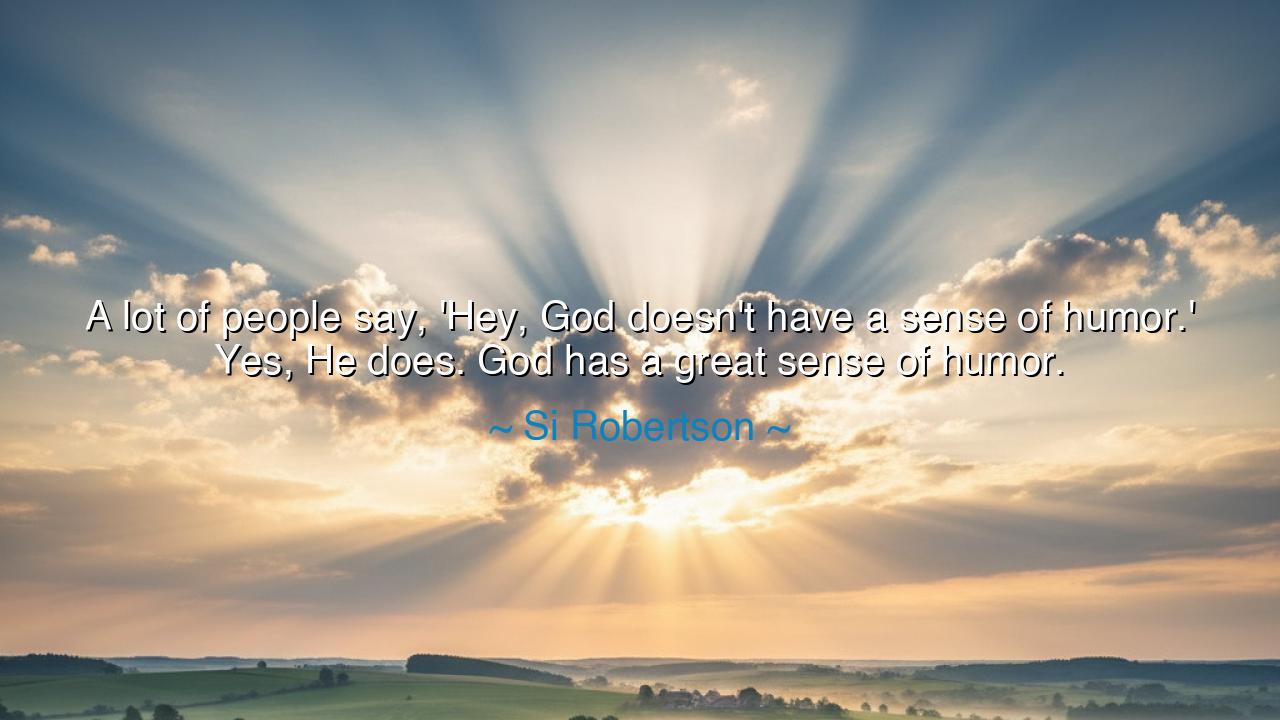
A lot of people say, 'Hey, God doesn't have a sense of humor.'
A lot of people say, 'Hey, God doesn't have a sense of humor.' Yes, He does. God has a great sense of humor.






“A lot of people say, ‘Hey, God doesn’t have a sense of humor.’ Yes, He does. God has a great sense of humor.”
So spoke Si Robertson, a man known for his laughter and his faith, whose words carry both playfulness and profound truth. In this simple statement lies an eternal reflection on the divine — that humor, far from being irreverent, is a holy flame, a reminder that joy and creation spring from the same divine source. For in the laughter of humankind, we hear the echo of heaven’s own mirth, a whisper that even amidst sorrow and confusion, the Creator delights in the dance of life.
The meaning of Robertson’s words stretches deep into the ancient heart of wisdom. Many imagine the Divine as stern and distant — a being of thunder and judgment, seated in solemn majesty. Yet such a vision sees only half the truth. For how could a universe so filled with absurdity, surprise, and spontaneous wonder exist without divine humor? Consider the peacock, whose feathers shimmer like jewels; the dolphin, who plays in the waves; the laughter of a child, pure and boundless — are these not signs that joy is woven into the fabric of creation itself? To say that God has a sense of humor is to affirm that He loves life, that He rejoices in the unexpected, and that even in the darkest moments, there is light to be found in laughter.
In the ancient world, the wise also spoke of this truth, though in different tongues. The philosopher Socrates, when condemned to death, drank his cup of hemlock with calm and wit, jesting with his friends as the poison reached his heart. His final act was not despair, but humor — a last spark of human spirit before the eternal. Through that laughter, he showed his disciples that fear has no dominion over the soul that trusts in something greater. Humor, then, becomes not the denial of pain, but the transcendence of it — a sacred rebellion against hopelessness.
So too did Abraham and Sarah, when told in their old age that they would bear a son, laugh aloud at the promise. Yet God did not rebuke them for their laughter; He sanctified it. The child born to them was named Isaac, meaning “he will laugh.” In this story, the divine message shines clear: even when life appears impossible, joy remains the truest response to faith. God Himself, it seems, delights in irony, in the wonder of impossible blessings made real. Thus, to laugh is to agree with heaven — to trust that the divine story unfolds with wit as well as wisdom.
Si Robertson, in his earthy way, carries forward this same understanding. He reminds us that humor does not belittle faith — it deepens it. For to laugh is to acknowledge both our smallness and God’s greatness. We laugh because we are humbled by the mysteries we cannot solve, because we see the folly of our pride, and because we sense that even our flaws are part of a larger, loving design. The Almighty, who formed us from dust, must surely smile at the spectacle of His children stumbling, learning, and trying again — and in that smile, we find grace.
Indeed, history itself testifies that laughter has preserved the human spirit when nothing else could. During the darkest days of war and hardship, soldiers in trenches shared jokes under fire; in prisons and exiles, poets wrote words that made others laugh through tears. Humor, born from faith, becomes the soul’s armor — proof that despair cannot conquer the heart that still finds joy. Thus, when Robertson says that God has a great sense of humor, he is not being irreverent; he is pointing to the divine resilience that sustains life itself.
And so, let us draw this lesson for our own lives:
-
Find joy in the ordinary, for every sunrise and mistake contains a trace of divine playfulness.
-
Laugh often and humbly, for humor is the breath of the soul that trusts in something greater.
-
See God in the absurd, for it is there that faith learns to bend without breaking.
-
Share your laughter, for in bringing light to others, you join in the Creator’s own joy.
Thus spoke Si Robertson, echoing the laughter of prophets and poets before him: that to live with faith is not to live without humor, but to laugh with the heavens. For in that laughter lies both reverence and freedom — the freedom to face life’s trials without fear, and the reverence to see that even our imperfections are part of a divine joke too grand and beautiful to be cruel. Yes, God has a sense of humor — and in discovering it, we rediscover the sacred joy of being alive.






AAdministratorAdministrator
Welcome, honored guests. Please leave a comment, we will respond soon